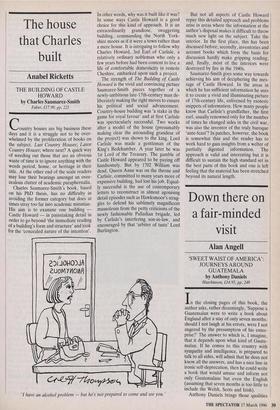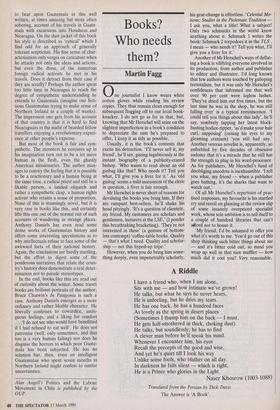Down there on a fair-minded visit
Alan Angell
`SWEET WAIST OF AMERICA': JOURNEYS AROUND GUATEMALA by Anthony Daniels
Hutchinson, £14.95, pp. 249
In the closing pages of this book, the author asks, rather disarmingly, 'Suppose a Guatemalan were to write a book about England after a stay of only seven months: should I not laugh at his errors, were I not angered by the presumption of his enter- prise?' The answer to which is, I imagine, that it depends upon what kind of Guate- malan. If he comes to this country with sympathy and intelligence, is prepared to talk to all sides, will admit that he does not know all the answers, and has a nice line in ironic self-deprecation, then he could write a book that would amuse and inform not only Guatemalans but even the English (assuming that seven months is too little to include the Welsh, Scots and Irish).
Anthony Daniels brings those qualities to bear upon Guatemala in this well written, at times amusing but more often sobering, account of his travels in Guate- mala with excursions into Honduras and Nicaragua. On the dust jacket of this book his style is described as 'cynical' which I find odd for an approach of generally tolerant scepticism. His fine sense of char- acterisation only verges on caricature when he attacks not only the ideas and actions, but even the dress, of the numerous foreign radical activists he met in his travels. Does it detract from their case if they are scruffy? Perhaps the author spent too little time in Nicaragua to reach the degree of sympathetic understanding he extends to Guatemala (imagine our ficti- tious Guatemalan trying to make sense of Northern Ireland in a couple of weeks). The impression one gets from his account of that country is that it is hard to find Nicaraguans in the midst of bearded fellow travellers enjoying a revolutionary experi- ence at other people's expense.
But most of the book is fair and sym- pathetic. The monsters he conjures up in his imagination turn out to be a lot more human in the flesh, even the ghastly American missionaries. The author man- ages to convey the feeling that it is possible to be a reactionary and a human being at the same time, a radical priest and still be a likable person, a landed oligarch and rather a sympathetic chap, a human rights activist who retains a sense of proportion. None of this is stunningly novel, but it is very rare in books like this, and certainly lifts this one out of the normal run of such accounts of wandering in strange places. Anthony Daniels has even read some dense works of Guatemalan history and offers some interesting speculations as to why intellectuals refuse to face some of the awkward facts of their national history. Again, the conclusions are hardly startling, but the effort to digest some of the ponderous narratives that relate the coun- try's history does demonstrate a real deter- mination not to parade stereotypes.
In the end, books like this are read out of curiosity about the writer. Some travel books are brilliant portraits of the author; Bruce Chatwin's In Patagonia is such a case. Anthony Daniels emerges as a more ordinary and rather likable character. He liberally confesses to cowardice, ambi- guous feelings, and a liking for comfort do not see who would have benefitted if I had refused to eat well'. He does not patronise (well, only sometimes, and that too is a very human failing) nor does he disguise the horrors to which poor Guate- mala has been subjected. He has no solution but, then, even an intelligent Guatemalan who spent seven months in Northern Ireland might confess to similar uncertainties.
Alan Angell's Politics and the Labour Movement in Chile is published by the OUP.



























































 Previous page
Previous page